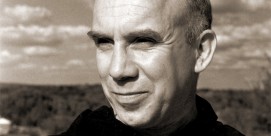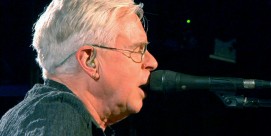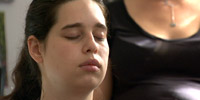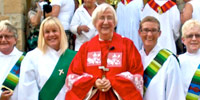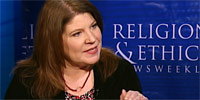Exploring Religious America
EXPLORING RELIGIOUS AMERICA
A Poll Conducted for RELIGION & ETHICS NEWSWEEKLY and U.S. NEWS & WORLD REPORT
by Mitofsky International and Edison Media Research
March 26 – April 4, 2002
INTRODUCTION
Americans are tolerant when it comes to other religions; they are not threatened by other religions; and yet they don’t know much about them. These are the main findings of our national telephone survey of 2,002 adults in the United States. Mitofsky International and Edison Media Research conducted this survey, “Exploring Religious America,” for the weekly Public Broadcasting Service television program RELIGION & ETHICS NEWSWEEKLY and U.S. NEWS & WORLD REPORT.
Banner 1 (PDF, 300 KB)
Banner 2 (PDF, 289 KB)
Banner 3 (PDF, 272 KB)
Banner 4 (PDF, 297 KB)
Banner 5 (PDF, 348 KB)
Banner 6 (PDF, 267 KB)
This report details the main findings of the survey:
- Most Christians feel they are tolerant of other religions.
- Americans see religious diversity as a strength and not as a threat.
- Many of these very religious and very tolerant Americans know neither people of other religions nor much about religions other than their own.
- Many Americans turned to their religion to deal with the aftermath of the events of September 11th
- While Americans are evenly split on their overall view of Islam as a religion, most Americans expect a bigger armed conflict soon between Christian and Islamic countries.
- About one half of Americans say they attend religious services at least once per week, and large numbers say they attend prayer group meetings and Bible study.
- By nearly three to one, Catholics believe that Catholic priests should be allowed to marry.
RELIGIOUS TOLERANCE — RELIGIOUS THREATS
For the most part, Americans are accepting and tolerant of people who have religious beliefs that are different than theirs. They think all religions have elements of truth, and a large majority does not think of their own religion as the only true religion. They have this spirit of acceptance and openness to religious differences even though most do not personally know people who practice religions different than theirs or know much about the religious beliefs of others.
Part 1: Exploring Religious America
Part 2: American Protestants
Part 3: Catholicism in America
Part 4: Spirituality
Part 5: Comments and Analysis
Christians see themselves as very tolerant of people of other faiths, with 81% of Christians saying that Christians in the United States are “very” or “somewhat” tolerant of people of other faiths. People who are not Christians agree with this view for the most part, but not nearly as many of them are fully convinced of Christian tolerance. Only 54% of non-Christians see Christians as being tolerant of people of other faiths.
Most people in the United States know someone who is Christian (94%) and are familiar with the basic teachings of Christianity (95%). But only half (51%) know a Jew or are familiar with the basic teachings of Judaism (50%). Very few people know a Muslim (28%), a Hindu (17%), or a Buddhist (17%), nor are there very many familiar with the teachings of these religions.
A majority (62%) thinks the religious diversity in the United States does not make it harder to keep the country together. Only about 1 in 4 finds diversity a problem. Religious diversity is not seen as a threat to their individual religious beliefs. Only 13% feel threatened in this way. Rather, they see this diversity as a source of strength for their beliefs (76%).
When asked what DOES threaten religious faith, they pick out “evil in the world” (61%) as the leading cause, followed by “materialism” (57%). They are somewhat divided about the role of “movies, TV, and popular music,” where as many see it as a threat (48%) as do not see it that way (49%). Less threatening are “nonreligious views of the world” (42%), and only one fourth (27%) see religion threatened by “science.”
RELIGION SINCE 9/11
About two thirds of Americans (64%) report that religion is a “very important part” of their lives. This is especially true among women (74%) and African Americans (89%). While Americans were focused on the events of the September 11th terrorist attack on the New York World Trade Center and the Pentagon in Washington, D.C., most of them — nearly 80% — said religion was important in helping them deal with what happened. Almost all of those who regularly attend church (93%) said religion was important in helping them. Even those who rarely or never attend religious services were significantly sustained by their religious faith.
The events of 9/11 did little to change an already strong commitment to religion or faith in God. More than 4 in 5 said that religion is as important in their lives as it was before the terrorist attacks (81%). And almost everyone said the attacks either strengthened their faith in God (27%) or did not change it (69%). Overall, about 1 in 5 said religion was more important since 9/11.
Americans overwhelmingly expect war with Islamic countries. Almost 3 in 4 Christians feel this way (74%), as do 3 in 5 non-Christians (61%). Even so, they are evenly divided on their views about the Islamic religion. As many view Islam favorably (36%) as unfavorably (37%). However, ten times as many think Islam harbors a larger number of violent extremists (39%) rather than a smaller number (4%) when compared to other religions. These views appear to be based mostly on the events of 9/11, as only a minority is personally acquainted with someone who is Muslim (28%) or say they are familiar with the Islamic religion (35%).
RELIGIOUS BELIEFS AND OBSERVANCE
The United States, for the most part, is a country made up of very religious people. Religious worship and other religious activities play an important role in the lives of 88% of its people. Almost half (47%) say they attend religious services at least once a week, sometimes more often. Two fifths (40%) say they attend prayer group meetings or Bible or Scripture study groups. And almost half (48%) say they are involved in the activities of their place of worship in addition to their attendance at religious services.
In order to get an idea of people’s views of their relationship to God or some other spiritual force, they were asked how often they experienced the presence of a supreme being close to them. Almost half (49%) of the Christians in the sample said that many times they have experienced “God’s presence or a spiritual force that felt very close to you,” while only 1 in 10 said this had never happened. Non-Christians, on the other hand, were evenly split. About one third (34%) said it happened many times to them and a like number (36%) said it never happened.
America is mostly a Christian country. Five out of six say they are Christians. Catholics and Protestants, in equal numbers, comprise half the adult population, 25% and 26% respectively. However, another 32% call themselves Christians but say they are not Catholics or Protestants. Almost half of Christians say they are “born again,” and one fourth describe themselves as “Evangelical Christians.” The born again and the Evangelicals come from all the Christian denominations, including Catholics. They come mostly from the group of Christians who describe themselves as neither Catholic nor Protestant. The Evangelicals, on the other hand, come mostly from among those who call themselves Protestants.
| Percentage of Christians claiming to be: | |
|---|---|
| Born Again Christians | 46% |
| Catholics | 21% |
| Protestants | 52% |
| Other Christians | 63% |
| Evangelical Christians | 24% |
| Catholics | 10% |
| Protestants | 39% |
| Other Christians | 26% |
Jews and Mormons are each another 2% of the total. Muslims, Hindus, and Buddhists are each less than 1% of the population. About 3% claim some other religion. Nonbelievers make up 8% of all adults — 3% are agnostic, 2% are atheist, and 3% have no religious preference.
Those who attend religious services were asked to choose three reasons from among seven choices about what was most important when it came to choosing a church, synagogue, mosque, or temple to attend. More than half (55%) of Christians said “beliefs, doctrines, and creeds” were important in their choice of a place of worship. Next were “a sense of community” and the “minister, priest, or rabbi,” each selected by 51%.
However, when people were asked a separate question, a stronger reason emerged. By a margin of almost 3 to 1, respondents chose “an individual’s spiritual experience” (69%) over “doctrines and beliefs” (24%) as the most important part of religion. “Spiritual experiences” were chosen over “doctrines and beliefs” by both non-Christians (73%-15%) and Christians (69%-26%).
The poll compared several items in their importance in helping people make decisions about their lives. This was the first sign of religion being less important than other alternatives. More than three quarters (77%) would rely upon their own personal judgments ahead of anything else. Of the four alternatives offered them, the teachings of their church or synagogue ranked last (51%). Family and friends ranked second (64%), followed by the Bible (60%).
CHANGE IN THE CATHOLIC CHURCH?
Catholics were asked about two issues that have been in the news recently as possible reforms in the Church. When it comes to priestly celibacy, most Catholics (70%) favor allowing priests to marry. This finding holds true for both men and women in just about every age group of Catholics. Only among two groups of Catholics does support for allowing priests to marry drop below 50%: those who are 65 years old and older and those who attend church more than once per week.
Catholics are more evenly divided about whether Catholic laity should have more of a say in the selection of bishops. As many would welcome this reform (48%) as want to continue to leave it to Church officials (44%). Again, support for this reform drops among older Catholics and those who frequently attend religious services.
NEWS COVERAGE OF RELIGION
Even though most people take the practice of their religion very seriously in this country, respondents see little religious news on television. By a 2-to-1 margin, more people believe there is too little news about religion on television (36%) than believe there is too much (17%). A plurality (39%) thinks that there is just the right amount of news about religion on television currently. Non-Christians are more evenly divided between too little (28%) and too much (23%).
HOW THE SURVEY WAS CONDUCTED
This report summarizes the results of a national telephone survey conducted by Mitofsky International and Edison Media Research regarding religious beliefs and practices in the United States. This national survey interviewed 2,002 adults 18 years of age and older. It was conducted by telephone between March 26 and April 4, 2002. The sample households were selected using random digit dialing. One individual in each household was randomly selected to be interviewed. The final results were weighted to take account of the probabilities of selecting one individual per household and the varying number of telephone lines in a household. Weighting also was done to reflect the national age, sex, and racial demographic breakdown as estimated by the United States Census Bureau. The sampling error at a 95% confidence level depends on the sample size for the reference groups. The sampling error for different groups follows.
| Results based on: | |
|---|---|
| Total sample | ±2% |
| All Christians | ±2% |
| Catholics | ±4% |
| Protestants | ±4% |
| Other Christians | ±4% |
| Non-Christians | ±6% |

